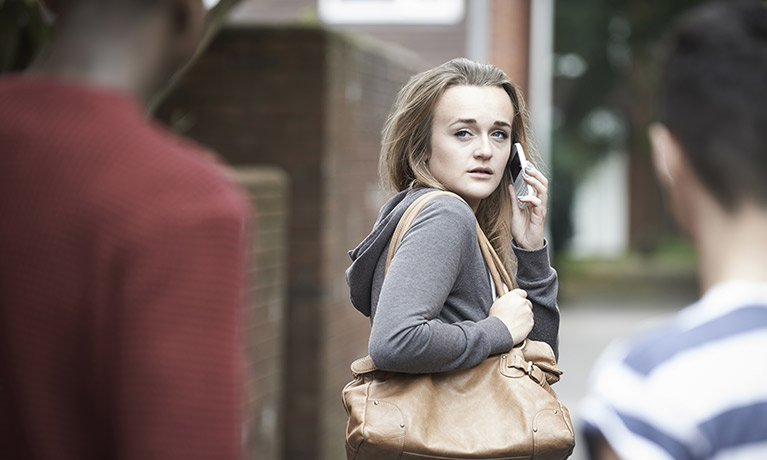Case Reporting System
If you have experienced or witnessed incidents because of your race, age, sex, gender identity, sexual orientation, disability, faith or any other reason, you can now report it via our new online support service.
To make a report anonymously, log a new report or to contact an advisor, please complete our case reporting system.
What is a hate crime/ incident?

- A hate crime is any criminal offence which is perceived by the victim or any other person, to be motivated by hostility or prejudice, based on a person's disability or perceived disability; race or perceived race; or religion or perceived religion; or sexual orientation or perceived sexual orientation or transgender identity or perceived transgender identity* or harassment for any other reason, such as harassment based on sex.
- Hate incidents are forms of discriminatory incidents resulting from actions of hostility motivated by prejudice or intolerance that are not currently criminal offences: these can include bullying, harassment and sexual harassment.
- Hate crimes/incidents are damaging to the entire university community. Reporting them, anonymously or not, can help to alter this behaviour and make the university safer for all.
What is sexual misconduct?
We’re committed to creating a safe, inclusive, and respectful environment for all students.
We take reports of sexual misconduct seriously and have clear procedures to support anyone affected.
This includes access to specialist support and a formal way to report incidents. Our policy applies to all students and staff across Coventry University Group and outlines behaviours that are not acceptable, such as any non-consensual sexual activity or harassment. We know anyone can be affected, and we handle all disclosures with care and sensitivity.
Staff are trained to respond appropriately, and we discourage personal relationships between staff and students to protect professional boundaries. If you need support, we’re here to listen and help.
- Visit our sexual misconduct and harassment single source of information page.
- View the Coventry University Group Sexual Misconduct Procedure
What is sexual harassment?

- Sexual harassment is unwanted behaviour of a sexual nature and can involve online and verbal comments, gestures or physical touching/assault. It can violate your dignity, make you feel intimidated, degraded or humiliated and creates a hostile or offensive environment.
- Sexual harassment is not acceptable behaviour. Reporting it, whether anonymously or not, can help to alter this behaviour and make the university safer for all.
- Incidents can still be considered sexual harassment even if the alleged harasser didn't intend this.
- Sexual harassment doesn't have to be intentionally directed at a specific person, it can be a one-off incident or ongoing.
What is bullying and harassment

- Bullying and harassment is any unwanted behaviour that makes someone feel distressed, intimidated, degraded, humiliated or offended. It is not always obvious or apparent to others and may interfere with an individual’s learning, working or social environment.
- Bullying and harassment is never acceptable behaviour. Reporting it, whether anonymously or not, can help to alter this behaviour and make the university safer for all.
- Bullying and harassment can be between two individuals or may involve groups of people and can also occur in written communications, online, by phone or email, not just face-to-face.
- Bullying and harassment can be sexualised or related to a protected characteristic such as age, disability, gender reassignment, marriage or civil partnership, pregnancy or maternity, race, religion or belief, sex or sexual orientation.
Our commitment to Hate Crime/Incident Awareness
Please be aware some of the information on this page may be upsetting or triggering; if you feel distressed at any time, please stop reading and seek support.
Anyone can be a victim of a harassment or hate incident. This could be related to age, disability, gender reassignment, race, religion or belief, sex and sexual orientation or the perception of these characteristics – find out how to report an incident.
This page aims to provide our communities with some recent context around the issues of hate crime/incidents and harassment and the impacts these incidents can have on individuals, as well as highlighting our regular awareness campaigns and activity.
This information is updated regularly by our specialist case workers.
Hate crime and harassment awareness in context
(Updated October 2021)
- In the 12 months to March 2020, there were 105,090 hate crimes recorded by the police in England and Wales.[1]
- Excluding Greater Manchester police, this signified an increase of 8 per cent compared with year ending March 2019 (97,446 offences).[2]
- Victim Support figures show that since the easing of lockdown restrictions in England from 29 March 2021, hate crime referrals increased to 67% above average levels.[3]
- Major hate crime incidents such as the murders of George Floyd[4] in the USA and of Nicole Smallman and Bibaa Henry[5] in the UK, saw the resurgence of the Black Lives Matter movement.[6]
- #StopAsianHate became a trending campaign resulting from the impact of hate towards Asian people during the COVID-19 pandemic.[7]
- The high-profile cases of Sarah Everard[8] and Sabina Nessa[9] have highlighted the lack of safety for young women in city centres, and the Everyone’s Invited[10] website in 2021 has highlighted harassment and hate incidents in places of education, including universities.
Impact
The effects of harassment and hate incidents can be long-lasting, and impact the confidence, physical health and emotional wellbeing of people targeted, and communities and families. The Crime Survey for England and Wales (CSEW: 2018-2020) found that hate crime victims were more likely than victims overall to say they were emotionally affected by the incident (96% and 83% respectively) and to say they were “very much” affected by the incident compared to non-hate crime victims (36% and 15% respectively).[11]
Meet our case workers
We support staff and students that have experienced or witnessed harassment or hate incidents. We sit within the Health and Wellbeing department of Student Services.
Harassment Reporting is entirely confidential unless express consent is given or safeguarding needs arise. Even here, we will discuss and take you along with us.
Coventry University is unable to provide an emergency response service. For emergencies, please contact the police or ambulance service on 999.
Amber Taroni specialises in the issue of sexual violence
Simi Shergil specialises in the issues of honour based abuse and forced marriage.
Resources
Coventry University Bystander training
This online module aims to foster a safe, positive campus where all students feel able to achieve their very best educationally and also enjoy their university experience.
The module will explore what an active bystander is, how you can intervene (if it is safe to do so) and offers filed examples of the type of harassment/hate incidents that can occur. Once completed, you can fill out a feedback form and receive a certificate for your portfolios.
Useful Links
Support and Report
Detailed information on the case reporting process, what you need to include in a report, and further useful questions and answers.
This outlines the Group’s approach in supporting enrolled students who have experienced sexual misconduct in whichever form it presents. It also outlines the formal procedure for students reporting an incident.
Get information on the numerous Student Wellbeing services we have on campus.
Learn about Your Student's Union Advice Centre, located in The Hub.
Discover external organisations that can help you if you've been a victim of crime.

This page and the online reporting system are a result of funding from HEFCE and are part of the University’s University Challenge project.
Contact Amber Taroni for more information.





